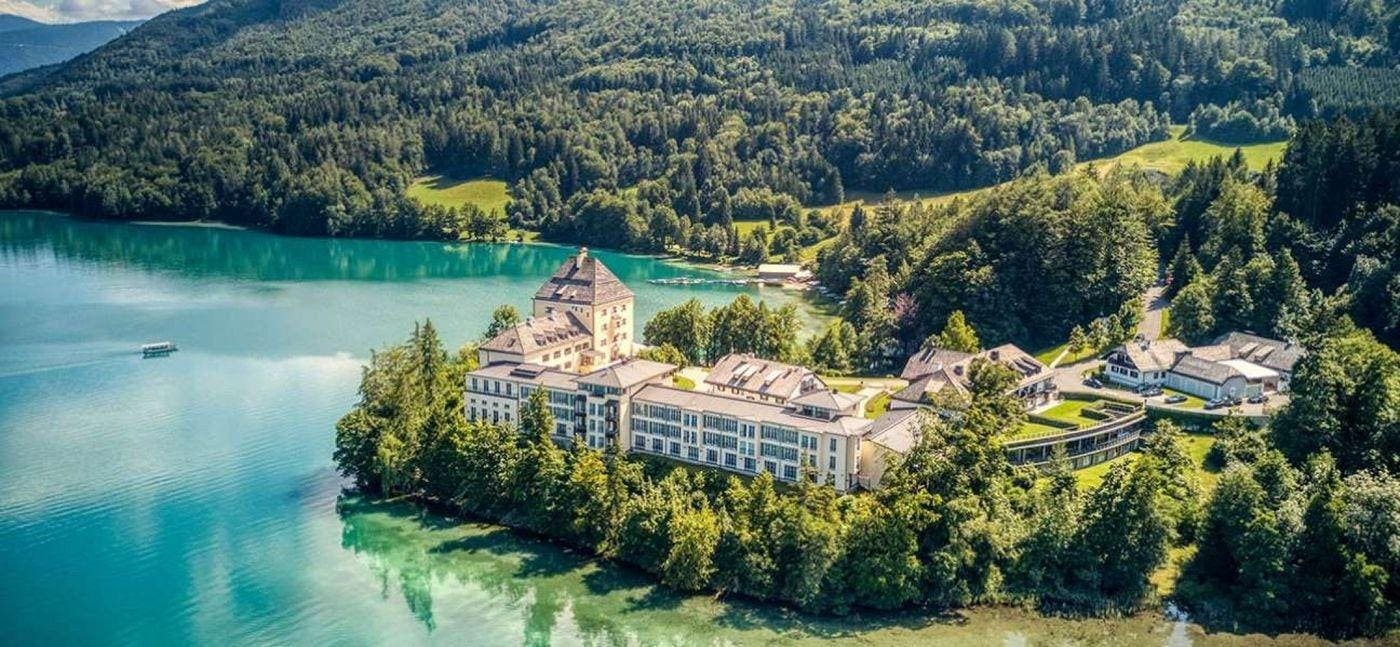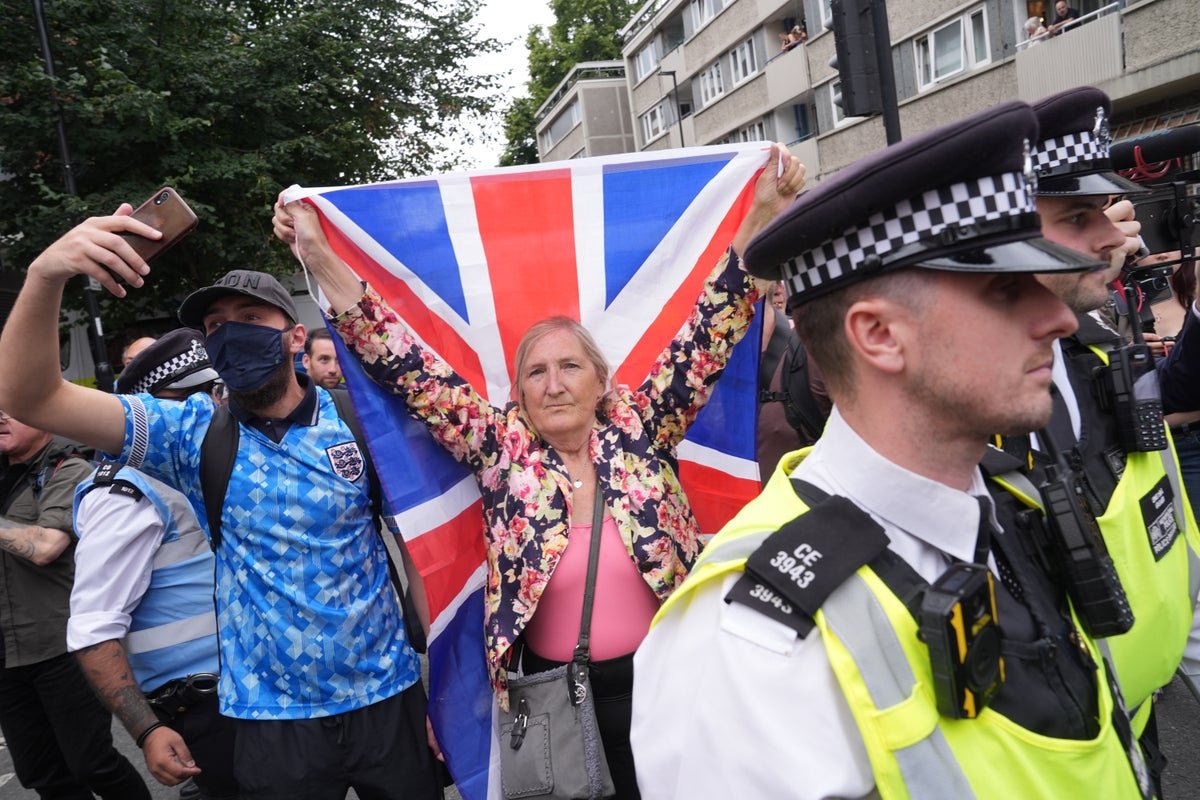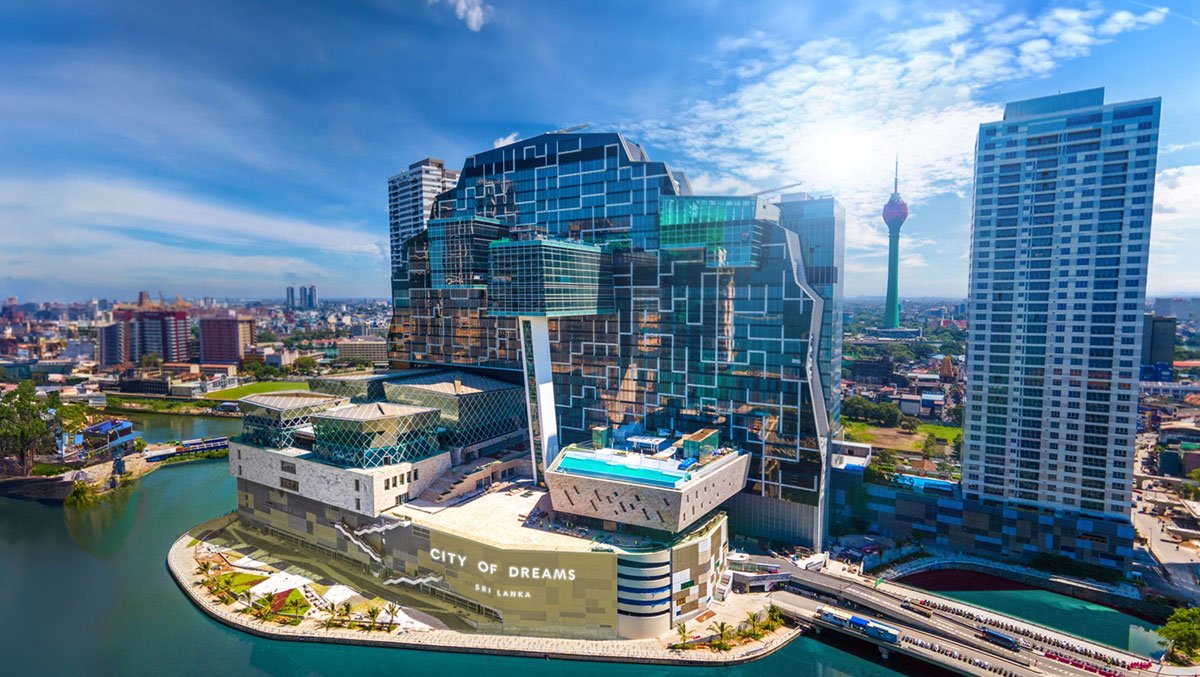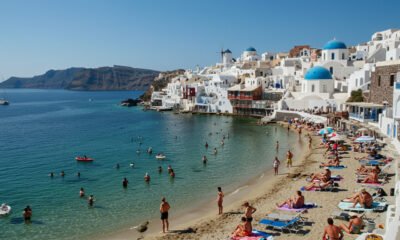Hotels & Accommodations
Best Historic Hotel Restorations in Europe: Vienna, Salzburg, Cologne

Across Europe, a handful of historic buildings—castles, water towers, city palaces—have been turned into luxury hotels. They are architectural landmarks restored with a level of care more often seen in private estates or museums than hotels.
Some are backed by big names. Others are family-owned, one-off investments. What they have in common is a refusal to flatten history into décor.
From a 19th-century water tower in Cologne to a palace on Vienna’s Ringstrasse, these three hotels show what happens when architecture isn’t adapted to hospitality—but hospitality to architecture.
The surrounding landscape and the history of Rosewood’s Schloss Fuschl are just as beautiful as the inside.
Rosewood
Once a 15th-century hunting lodge for Salzburg’s prince-archbishops, Schloss Fuschl has hosted everyone from European royalty to Romy Schneider, whose Sissi films helped cement the castle’s cinematic aura around the world.
Now, the property reopened as Rosewood Schloss Fuschl after a multi-year renovation, backed by an undisclosed investment from its owner. And the lakeside retreat near Salzburg has returned with a sharpened sense of place.
The castle was meticulously restored by the Schörghuber family—well-known patrons of the arts—and now houses what’s rumored to be Europe’s largest private art collection ever shown in a hotel. The interiors blend international polish with regional craftsmanship, pairing Austrian fabrics and restored antiques with discreet contemporary touches.
The minibar has a hand-painted scene by a local artist reflecting the scenery outside.
Rosewood Schloss Fuschl
Rosewood Schloss Fuschl brings heritage suites that mirror the tones of Alpine seasons, carpets inspired by wildflowers and Dirndls and minibars hand-painted by a local artist to echo the landscape outside.
A forest-fringed infinity pool channels old-world spa culture with contemporary restraint, while menus across its restaurants and tea salon lean heavily on regional sourcing—including honey from the estate’s own bees and fish directly from the lake out front.
The interior reminds guests of the castle’s heritage as a former hunting lodge.
Rosewood Schloss Fuschl
Guests may come for the view of Lake Fuschl, but the more lasting impression is how seamlessly history, design and landscape work together in one of the most thoughtful revivals of a historic European hotel.
How To Travel To Rosewood Schloss Fuschl
Rosewood Schloss Fuschl is 30 minutes by car from Salzburg’s city center or airport. From Munich, it’s a 2.5-hour drive; from Vienna, just under 3 hours by car or around 3.5 hours by train (via Salzburg).
The Amauris is a new luxury boutique hotel in Vienna with a rich history.
Amauris
On Vienna’s centrally located Ringstraße, most luxury hotels come with decades of hospitality pedigree and big-brand backing. There are, for example, the Ritz-Carlton, Marriott’s famous Hotel Imperial, and, most recently, the Palais Hansen by Anantara.
Next to those, The Amauris is a rare and refreshing newcomer.
Built and operated by the Breiteneder family—an Austrian dynasty known for real estate and parking garages—the hotel marks their first foray into hospitality.
The Breiteneders didn’t need outside investors, and it shows. Their neo-Renaissance Palais falls under strict landmark regulations and was restored inside and out with an obsessive eye for detail.
Nearly everything has been tailor-made, from the heavy Italian marble doors—devoid of handles and designed to swing open at the touch of a room key—to one of the last original Stigler elevator with its cast-iron cladding still in operation.
The design concept inside The Amauris uses high-end fabrics, clean lines and contemporary elegance.
Amauris
Rooms are unusually spacious for the city, and the service is quietly attentive and kind, without the stiffness often associated with five-star hospitality.
Next to the lobby, the restaurant Glasswing already draws attention from the Michelin Guide as well as locals for its ambitious, regionally grounded menu. Much of the art on the walls—both in the dining room and the cocktail bar—comes from the family’s private collection and reflects styles popular when the Palais was first built, adding a layer of intimacy and historical texture that’s hard to manufacture at scale.
The pool in the Amauris features a retractable roof.
Amauris Vienna
The small but striking spa features a sauna, steam bath, and a hydrotherapy pool in the courtyard with a retractable glass roof—ideal for stargazing in the middle of Vienna.
Everything about The Amauris feels like a legacy project—something created for the long haul.
From the outside, it still looks the same. But a boutique hotel beckons on the inside.
Wasserturm Cologne Hilton
When Cologne’s water tower began operations in 1872, it was the tallest in Europe and the industrial showpiece supplied the city with fresh drinking water until 1930.
Today, the Wasserturm Cologne still looks much the same from the outside: a tiered, cylindrical landmark just south of the old town.
Soaring ceilings and exposed brick inside Cologne’s Wasserturm Hotel lobby.
Wasserturm Cologne
But inside, it’s been reimagined as a luxury boutique hotel that respects its industrial bones—making it a natural fit for Hilton’s Curio Collection, which selects distinctive properties for their architectural integrity and strong sense of place.. The Wasserturm is currently the only Curio hotel in Germany—a fact that becomes obvious the moment you step inside.
Wassertum Cologne is a one-of-a-kind lifestyle hotel with standout design features.
Wasserturm Cologne
The lobby stuns on arrival with original steel beams, exposed brick and a spiraling black staircase rising into a 33-foot atrium bathed in moody, architectural lighting. Curved corridors above the lobby wrap around the tower’s hub, leading to guest rooms tucked into vaulted alcoves.
One of the most stunning rooms is the double-height Art Suite by local pop artist Sascha Dahl. Thirty-five original works by Dahl stretch across two levels, adding playful bursts of color and personality to the crisp, contemporary interior.
The Rooftop Bar has panoramic views of the city.
Wasserturm Cologne
Where machinery once whirred, the rooftop bar now offers 360-degree views of the city, with Cologne’s cathedral spires rising just beyond the . The drinks lean local—apple schnapps from the nearby Rhine region, cold-pressed juices and house cocktails that reflect the same clarity and understatement as the space itself.
It’s the combination of preserved industrial architecture, contemporary art and a clear connection to Cologne’s cultural life that gives the Wasserturm its staying power.
The monumental 19th-century brick rotunda once held the city’s drinking water.
Hilton Wasserturm Cologne
MORE FROM FORBES:
Hotels & Accommodations
Rival groups clash outside London asylum hotel as police issue arrest warnings

Rival protest groups have clashed outside a London asylum hotel as police issued an urgent arrest warning.
Several demonstrators were detained by officers on Saturday (2 August) after clashing with rival groups at a protest against the use of the Thistle City Barbican Hotel in Islington, north London, to accommodate asylum seekers.
People believed to be migrants watched the protests from the hotel’s windows, with some waving and blowing kisses as demonstrators chanted and banged drums in the street below.
A man wearing an England football shirt was detained by police after a confrontation with officers.
A group of anti-fascist protesters blocked a junction outside the hotel.
Officers then pushed into the crowd to detain several people, dragging them out by their arms and legs.
The Metropolitan Police said the protest against the use of the Islington hotel was organised by residents under the banner “Thistle Barbican needs to go – locals say no”.
A counterprotest, organised by Stand Up To Racism and supported by former Labour leader Jeremy Corbyn, as well as other groups including Finsbury Park Mosque and Islington Labour Party, took place.
Police said the anti-asylum hotel protest had been “endorsed by groups from outside the local community, which is likely to increase the number of people attending”.
Online groups that have voiced support for the protest include “Patriots of Britain” and “Together for the Children”.
The Metropolitan Police said plans were in place to “respond to any protest activity in the vicinity of other hotels in London being used to accommodate asylum seekers”.
A counterprotester outside the Thistle City Barbican Hotel said he wants migrants to “feel safe” in the UK.
Student Pat Prendergast, 21, said: “I want people to feel safe. I think the [rival protesters] over there are making people feel unsafe.
“I want to stand up in solidarity and say that, you know, we want people here. We want migrants. We want asylum seekers.”
A noticeably smaller group of protesters waved union flags and held banners outside the hotel. “Get these scum off our streets”, one man chanted in the direction of the hotel.
A large group of masked protesters dressed in black, chanting “we are anti-fascist”, appeared from a side street and marched towards the rival group outside the hotel.
There were brief clashes before police rushed in to separate the two groups.
Chief Superintendent Clair Haynes, in charge of the force’s policing operation, said: “We have been in discussions with the organisers of both protests in recent days, building on the ongoing engagement between local officers, community groups and partners.
“We understand that there are strongly held views on all sides.
“Our officers will police without fear or favour, ensuring those exercising their right to protest can do so safely, but intervening at the first sign of actions that cross the line into criminality.
“We have used our powers under the Public Order Act to put conditions in place to prevent serious disorder and to minimise serious disruption to the lives of people and businesses in the local community.
“Those conditions identify two distinct protest areas where the protests must take place, meaning the groups will be separated but still within sight and sound of each other.”
Elsewhere across the UK, there were also posts online advertising a “For our children, for our future” protest in Newcastle outside The New Bridge Hotel.
A “Stop the far right and fascists in Newcastle” counterprotest was organised by Stand Up To Racism at the nearby Laing Art Gallery.
Northumbria Police have been approached for comment.
Meanwhile, about 100 people attended a protest outside the Stanwell Hotel in Spelthorne, Surrey, on Friday evening, during which a packet of lit firelighters was thrown at police, Surrey Police said.
A man was arrested on suspicion of attempted arson and inquiries are ongoing to trace another suspect, the force said.
Officers also arrested a man on suspicion of conspiracy to commit violent disorder and aggravated trespass following a protest at the same location on Thursday evening.
Hotels & Accommodations
City of Dreams casino and luxury hotels aim to up Sri Lanka’s tourism game

ECONOMYNEXT – Sri Lanka, the world and US and the world is suddenly facing a triple whammy from the nationalist and interventionist actions of President Donald Trump that as well as the effects of the Fed’s inflationism via the excess liquidity driven single policy rate (ample reserves regime).
The Dow Jones index tumbled 1.23-pct (542 points) on Friday as the Trump tariffs went into effect, albeit at a lower than initially expected rate.
The Euro Stoxx 50 Index fell 154 points or 2.9 percent, with the FTSE 100 falling 0.7 percent, and the Nikkei falling 270 points, or 0.66 percent.
Regime Uncertainty
Trump’s actions where the government changes the expected rule of the game is called regime uncertainty.
Regime uncertainty which is an undermining of established rules governing, reduces the confidence of doing business and creates uncertainty and distrust of the system.
The so-called New Deal, where a number of state interventions were made by the Democratic government by mostly Keynesians killed investment and the first recovery from the Great Depression by making the investment environment uncertain.
Among the interventions was the devaluation of the US dollar and banning gold for both private holding and contract writing which led to savers being expropriated.
Sri Lanka has done extremely well to reduce the Trump tariff to 20 percent and ward off the worst effects.
In Sri Lanka President Anura Kumara Dissanayake has been acting carefully not making any sudden decisions giving continuity and policy stability except for one or two incidents.
READ MORE : Regime Uncertainty: Why the Great Depression Lasted So Long and Why Prosperity Resumed after the War
Private citizens and businesses are un-armed and easily spooked, and it matters little to them whether pre-existing rules are de jure or de facto.
Sri Lanka Customs for example has ordered the re-export several hundred cars after suddenly deciding to implement a rule they had been ignoring for years and has signalled as permissible procedure in one intervention.
The Trade Ministry imposed price controls and created problems, but largely Sri Lanka has been a steady ship under the current administration allowing economic agents to work within a known system.
Resisting calls to ‘do something’ and intervene is difficult to resist.
The Disappearing Jobs
The second whammy on Friday was the revised jobs report, showing that new jobs created in May and June (after Trump’s taxes in April) was much, much lower than previously reported.
Predictably Trump killed the messenger by sacking the Erika McEntarfer, the commissioner of the Bureau of Labour Satistics claiming that jobs data “are being produced by Biden appointee”.
“We need accurate Jobs Numbers,” Trump wrote on his Truthsocial.com platform. “She will be replaced with someone much more competent and qualified. Important numbers like this must be fair and accurate, they can’t be manipulated for political purposes.”
https://truthsocial.com/@realDonaldTrump/posts/114954846612623858″
McEntarfer said there were only 73,000 Jobs added (a shock!) but, more importantly, that a major mistake was made by them, 258,000 Jobs downward, in the prior two months,” Trump added.
“Similar things happened in the first part of the year, always to the negative.”
It is normal for jobs to fall when the Fed ends an artificial boom of its own creation, which creates jobs that would not have been there had it been running a more prudent policy.
The Fed had been running a highly inflationist framework called the ample reserves regime, with trillions of excess liquidity, which was started by Bernanke to push up asset prices after the collapse of the housing bubble.
Macro-economists in the Fed, (which then infected the ECB) later ‘normalized’ the abundant reserve regime, adding fuel to the crypto bubble, stocks and also emerging market debt. As the single policy rate hit those countries, they are defaulting.
War Drums Whammy
The third whammy on the triple witching Friday was Trump deploying nuclear subs closer to Russia, after comments by ex-Russian President Dmitry Medvedev.
After years of being what is generally called a ‘Putin Lover’ and peddling his false narrative that Russia attacked Ukraine due to its wish join NATO, Trump has now suddenly fallen out with his friend during visits to Russia as a private investor.
Ukraine gave up nuclear arms and no one was interested in joining NATO until Putin attacked Georgia after cutting its debt with oil profits from the Fed housing bubble and strengthening its economy.
Instead of ignoring Medvedev Trump has now deployed nuclear subs.
Putin is a cool customer who has run one of the largest and most resource rich, and resourceful countries for decades, killing off the democratic opposition and tightening his grip on the system.
Trump is the leader of a democratic nation, who has term limits, a free press and a voting population who are used to kicking out Presidents like empty Coke cans.
While Trump has an advantage in extreme socialist policies of the Democrats and a Fed which is creating inflation and unhappiness after dumping its scarce reserve regime for the single policy rate, the business community which funded him is far from happy.
Is there a ticking bomb in the US?
After years of stimulus advocated by macro-economists, US government finances are in a bad state.
Russia avoided the stimulus and had very strong government finances until the start of the war. However, now the situation is different.
Though the Ruble was successfully floated under a 4 percent inflation target the Bank of Russia has been unable to fully bring down inflation. Russia is also trying to fight war with mercenaries, no conscription and the economy has started to slow down.
The US fiscal bomb, if it goes off however can have devastating consequences, more than other countries, since the entire world is linked to the country.
RELATED : Sri Lanka could get hit from a disorderly US tumble: Bellwether
Due to pressure from the macroeconomists in the Fed and Treasury and mistaken criticism of the Asian savings glut, countries like China and others are no longer firmly pegged to the US dollar and buying Treasuries as they did from 1950 to around 2005.
After 2014 when China and others shifted to more floating regimes, reserve collection has basically stopped. That is an own goal of the macroeconomists who shouted from the rooftop when long term rates did not go up when the Fed hiked rates shortly before the housing bubble broke.
When money was printed to fire the housing bubble by the Fed large volumes went to housing. Now banks are scared of housing and there are actual housing shortages in many countries. Instead money went to government debt for macro-economic policy and stimulus.
Government balance sheets are remarkably bad, compared to the end of the housing bubble and the Great Depression.
In the deflationary late 1990s the US ran budget surpluses for the first time since the collapse of the gold standard. Fed fired the Roaring 20s bubble in the 1920s as Treasury ran budget surpluses.
Macro-economists have hit own goals all over.
The Trump tariffs have brought more revenues to the government, which is good, but it must have come as lost profits (and new jobs it seems) in company balance sheets.
Trump’s expectations of greater investments – the US was a top recipient of FDI and bond investments in the past which created the trade deficit in the first place – due to its stable policies and practices like grandfathering, when rules were changed.
The biggest problem there seems to be little knowledge of how to fix the system in the US in both major parties.
US downturns tend to have ripple effects across the world and Sri Lanka has to be vigilant and not think that this country can ‘spend its way out of trouble’ as the US did from 2009 cutting rates when private credit is strong or going on capex spree. (Colombo/Aug02/2025)
Hotels & Accommodations
Protesters oppose one another at London hotel housing asylum seekers | Protest

Anti-racism demonstrators have turned out in large numbers outside a London hotel where asylum seekers are being housed to counter-protest against those opposed to it being used as Home Office accommodation.
Both groups of protesters gathered near the Thistle City Barbican hotel in Islington, north London.
The Metropolitan police said the anti-hotel protest was organised by a number of people under the banner “Thistle Barbican needs to go – locals say no”, but it has since been endorsed by groups from outside the area. Online groups that have voiced support for the protest include Patriots of Britain and Together for the Children.
One speaker at the anti-hotel protest, which had a turnout of about 100 people, claimed counter-protesters had been paid by “the Labour government and the trade unions” to attend. Some of those who gathered across the road from the hotel wore Mega (Make England great again) hats and one man was heard chanting “Get these scum off our streets” towards the hotel.
Directly outside the hotel, hundreds of people attended a counter-protest organised by Stand Up to Racism and supported by the former Labour party leader Jeremy Corbyn, who is the MP for Islington North, located on the other side of the borough. They far outnumbered the anti-hotel protesters.
Some people in the hotel could be seen watching the demonstration from their windows. Sarah Bailey, 63, who is retired, held a sign that said: “To everyone in the hotel, you are valued, wanted [and] welcome.
“I know somebody that has connections with this hotel. I thought it was so important, because I realised they would be looking out of the windows, that we send a positive sign saying you are all these three things.
“I think it’s so important to show people that have come here seeking safety and protection that they are welcome and to stand up to those who scare and bully them,” she said.
Pat Prendergast, 21, said: “I want people to feel safe. I think the [anti-hotel protesters] over there are making people feel unsafe. I want to stand up in solidarity and say that, you know, we want people here.”
A separate group of masked protesters, dressed in black and chanting “we are anti-fascist”, appeared from a sidestreet and marched towards the anti-hotel demonstration.
after newsletter promotion
The Met said plans were in place to “respond to any protest activity in the vicinity of other hotels in London being used to accommodate asylum seekers”.
A protest and counter-protest was also due in Newcastle outside the New Bridge hotel on Saturday. There were also posts online advertising a “For our children, for our future” protest in Newcastle on Saturday outside the hotel.
A “stop the far right and fascists in Newcastle” counter-protest has been organised by Stand Up to Racism at the nearby Laing art gallery.
On Friday evening, about 100 people attended a protest outside the Stanwell hotel in Spelthorne. Surrey police said a packet of lit firelighters was thrown at officers at the demonstration. The force added that a man was arrested on suspicion of attempted arson and inquiries were continuing to trace another suspect.
-

 Brand Stories2 weeks ago
Brand Stories2 weeks agoBloom Hotels: A Modern Vision of Hospitality Redefining Travel
-

 Brand Stories1 week ago
Brand Stories1 week agoCheQin.ai sets a new standard for hotel booking with its AI capabilities: empowering travellers to bargain, choose the best, and book with clarity.
-

 Destinations & Things To Do2 weeks ago
Destinations & Things To Do2 weeks agoUntouched Destinations: Stunning Hidden Gems You Must Visit
-

 Destinations & Things To Do1 week ago
Destinations & Things To Do1 week agoThis Hidden Beach in India Glows at Night-But Only in One Secret Season
-

 AI in Travel2 weeks ago
AI in Travel2 weeks agoAI Travel Revolution: Must-Have Guide to the Best Experience
-

 Brand Stories4 weeks ago
Brand Stories4 weeks agoVoice AI Startup ElevenLabs Plans to Add Hubs Around the World
-

 Brand Stories3 weeks ago
Brand Stories3 weeks agoHow Elon Musk’s rogue Grok chatbot became a cautionary AI tale
-

 Asia Travel Pulse4 weeks ago
Asia Travel Pulse4 weeks agoLooking For Adventure In Asia? Here Are 7 Epic Destinations You Need To Experience At Least Once – Zee News
-

 AI in Travel4 weeks ago
AI in Travel4 weeks ago‘Will AI take my job?’ A trip to a Beijing fortune-telling bar to see what lies ahead | China
-

 Brand Stories4 weeks ago
Brand Stories4 weeks agoChatGPT — the last of the great romantics



You must be logged in to post a comment Login